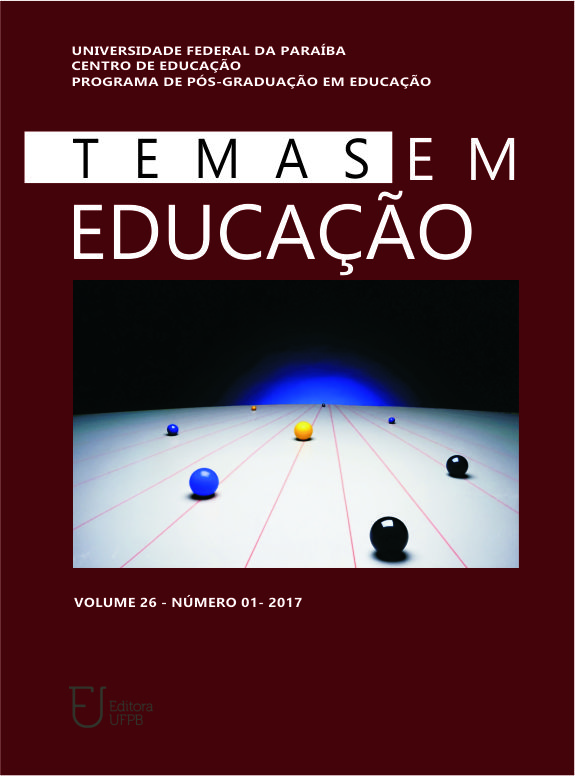LARGE-SCALE EVALUATION IN BASIC EDUCATION: A DISCUSSION ON THE USE OF RESULTS TO IMPROVE EDUCATION
LARGE-SCALE EVALUATION IN BASIC EDUCATION: A DISCUSSION ON THE USE OF RESULTS TO IMPROVE EDUCATION
DOI:
https://doi.org/10.22478/ufpb.2359-7003.2017v26n1.25931Keywords:
Assessment Policy, Use of results, Improvement of qualityAbstract
This article concerns the large-scale evaluation in Basic Education, in Brazil, based on the discussion about the limits and possibilities of using the results of these evaluations to improve the quality of Brazilian education. Firstly, we intend to work with some general and contextual notions to understand this type of evaluation in education, both in general and national scope. In the second point, we will approach the large-scale evaluations in Brazil, in view of the perception of some potentialities and possibilities and the problems and limits of these evaluations from the use of their results.In the third point, we will discuss the understanding and the problem of the use of these evaluations, considering the use of the results to improve the Basic Education in the country.The text evidences that, although Brazil currently has a consolidated Educational Assessment Policy, the use of the results of these evaluations is still one of the great challenges for the field of education policies.
Downloads
References
AFONSO, A. J. Avaliação educacional: regulação e emancipação. 4. ed. São Paulo: Cortez Editora, 2007.
CARNOY, Martin. A vantagem acadêmica de Cuba: porque seus alunos vão melhor na escola. São Paulo: Ediouro, 2009.
CASTRO, Maria Helena Guimarães de. Sistemas de avaliação da educação no Brasil: avanços e novos desafios. Perspectiva, São Paulo, v. 23, n. 1, p. 5-18, jan./jun. 2009.
COELHO, Maria Inês de Matos. Vinte anos de avaliação da educação básica no Brasil: aprendizagens e desafios. Ensaio: Avaliação e Políticas Públicas em Educação, Rio de Janeiro, v. 16, n. 59, p. 229-258, abr./jun. 2008.
DANTAS, Lys Maria Vinhaes. As contribuições das políticas de avaliação educacional em larga escala: o caso da avaliação de aprendizagem na Bahia. 2009. Tese (Doutorado) - Faculdade de Educação, Universidade Federal da Bahia, Salvador, 2009.
FERRER, Alejandro Tiana. Tratamiento y usos de la información em evaluación. Espanha: UNED,1997. Disponível em: http:/www.oei.otg.ar/noticias/tratamiento.pdf. Acesso em: 20 agos. 2015).
FERNANDES Reynaldo; GREMAUD, Amaury P. Qualidade da educação: avaliação, indicadores e metas. In: VELOSO, Fernando et al. (Org.). Educação básica no Brasil: construindo o país do futuro. Rio de Janeiro: Elsevier, 2009.
FRANCO, Creso. O SAEB - Sistema de Avaliação da Educação Básica: potencialidades, problemas e desafios. Revista Brasileira de Educação, São Paulo, n. 17, p. 127-133, maio/ago. 2001.
_______. Avaliação em larga escala e fatores associados ao desempenho escolar. In: GATTI, Bernardete (Org.). Construindo caminhos para o sucesso escolar. Brasília: INEP; UNESCO, 2008. p. 27-36.
MINHOTO, Angélica. Política de avaliação da educação brasileira: limites e perspectivas. In: SOUZA, A. R.; GOUVEIA, A. B.; TAVARES, T. M. (Org.). Políticas educacionais: conceitos e debates. Curitiba: Editora Appris, 2011. p. 163-188.
PREAL - Promoção da Reforma Educacional na América Latina e no Caribe. Saindo da inércia: Boletim da Educação no Brasil. Brasil: PREAL e Fundação Lemann, 2009.
RAVITCH, D. Vida e morte do grande sistema escolar americano: como os testes padronizados e o modelo de mercado ameaçam a educação. Trad. Marcelo Duarte. Porto Alegre: Sulina, 2011.
SANTOS, J. B. et al. Uso dos resultados do IDEB pela gestão escolar para a melhoria do ensino: um estudo nas escolas estaduais de Salvador e Região Metropolitana. In: TENÓRIO, Robinson Moreira; FERREIRA, Rosilda Arruda; LOPES, Uacaí de Magalhães (Org.). Avaliação e resiliência: diagnosticar, negociar e melhorar. 1. ed. Salvador: EDUFBA, 2012. p. 23-44. V. 1.
TENÓRIO, Robinson, SOUZA, Nayara. Prova Brasil: avaliação a serviço da qualidade educacional. In: TENÓRIO, Robinson; MACHEDO, Cristiane Brito; LOPES, Uaçaí de Magalhães. (Org.). Indicadores de educação básica: avaliação para uma gestão sustentável. Salvador: EDUFBA, 2010.
UNESCO - United Nations Educational, Scientific and Cultural Organization (1998). Primer estudio internacional comparativo sobre lenguaje, matemática y fatores asociados em tercero e cuarto grado. Santiago, Chile: UNESCO/Laboratorio Latinoamericano de Evaluacion de la Calidad de la Educación.
VELOSO, Fernando. Experiências de reforma educacional nas últimas duas décadas: o que podemos aprender? In: VELOSO, Fernando et al. (Org.). Educação básica no Brasil: construindo o país do futuro. Rio de Janeiro: Elsevier, 2009. p. 191-212.
VERHINE, Robert Evan. Prefácio. In: TENÓRIO, Robinson Tenório; MACHEDO, Cristiane Brito; LOPES, Uaçaí de Magalhães (Org.). Indicadores de educação básica: avaliação para uma gestão sustentável. Salvador: EDUFBA, 2010.
VIANNA, Heraldo Marelim. Avaliações nacionais em larga escala: análises e propostas. Estudos em avaliação educacional, São Paulo, n. 27, p. 41 -76, jan./jun. 2003.
WEISS, Carol. Have we learned anything new about the use of evaluation? American Journal of Evaluation, v. 19, n. 1, p. 21-33, 1998. Disponível em: http://www.aje.sagepub.com. Acesso em: 24 de Ago. de 2015.
Downloads
Published
How to Cite
Issue
Section
License
Authors who publish in this journal agree to the following terms:
. Authors retain the copyright and grant the journal the right to first publication, with the work simultaneously licensed under the Licença Creative Commons Attribution that allows the sharing of the work with acknowledgment of authorship and initial publication in this magazine. . Authors are authorized to assume additional contracts separately, for non-exclusive distribution of the version of the work published in this journal (eg, publishing in institutional repository or as a book chapter), with acknowledgment of authorship and initial publication in this journal.
. Authors are permitted and encouraged to publish and distribute their work online (eg in institutional repositories or on their personal page) at any point before or during the editorial process, as this can generate productive changes, as well as increase impact and citation of the published work (See O Efeito do Acesso Livre).



















